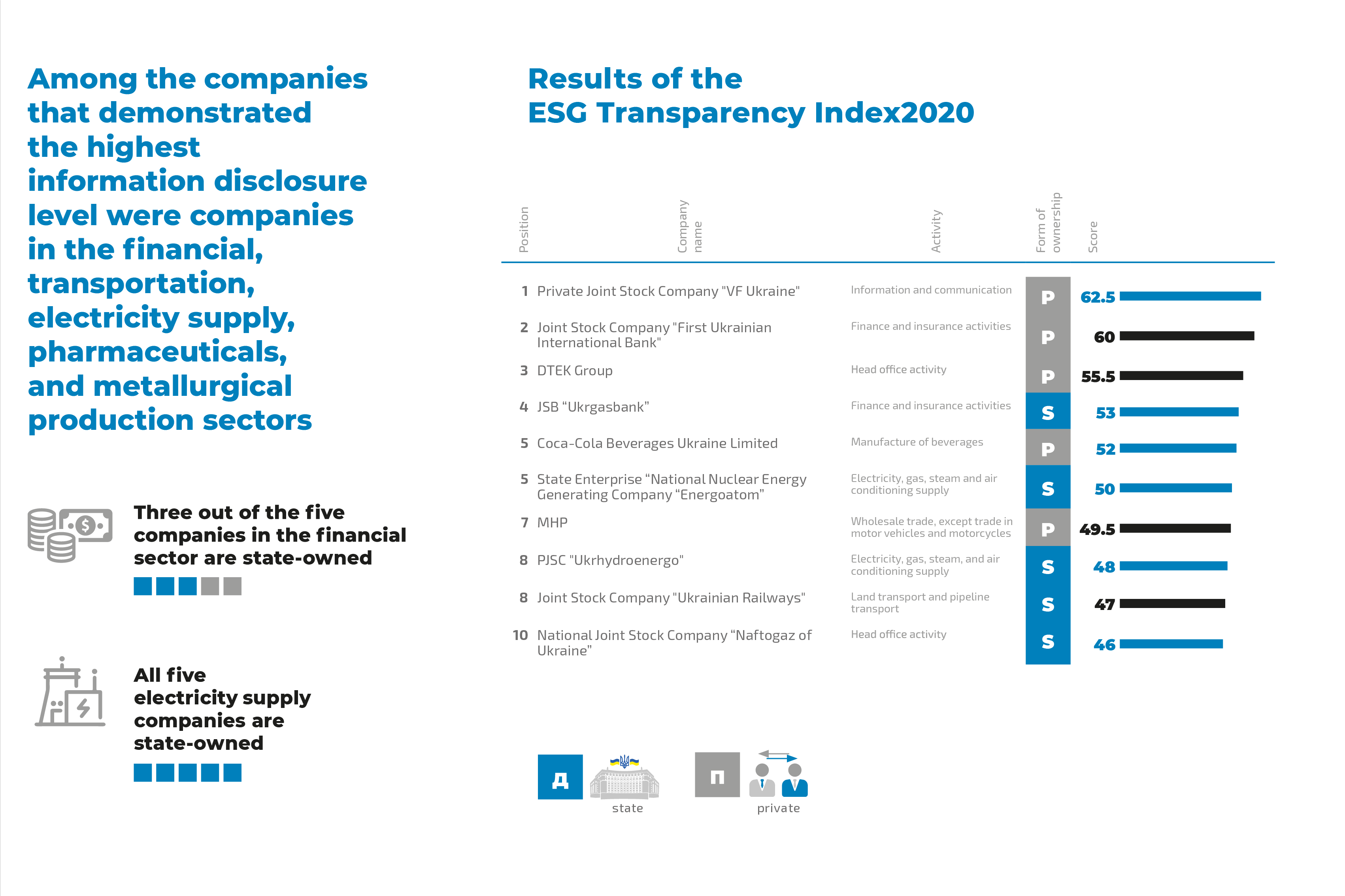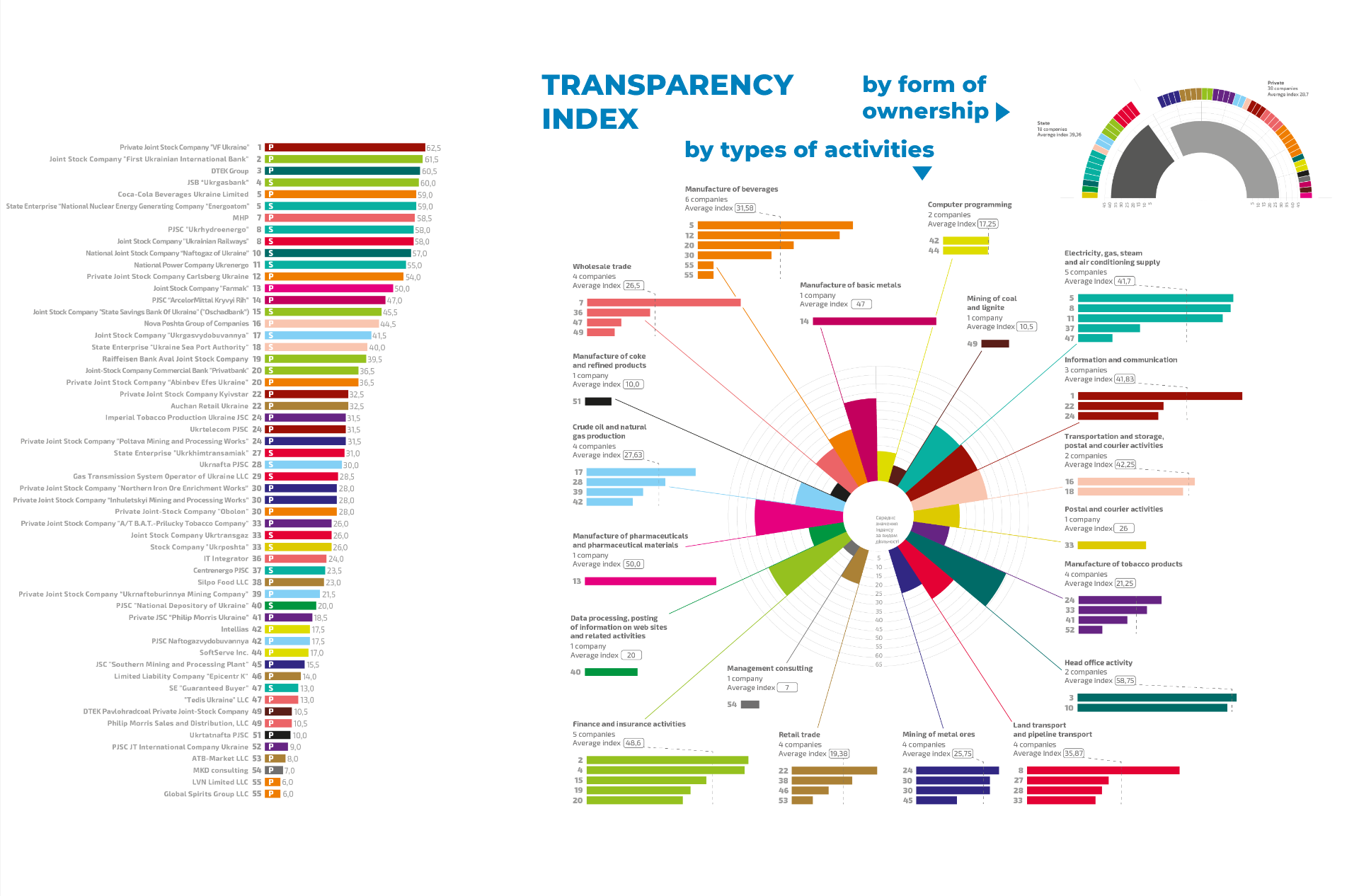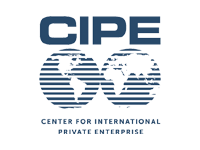The Corporate Governance Professional Association (CGPA) and the Centre for CSR Development Ukraine (CSR Ukraine), supported by the Center for International Private Enterprise (CIPE), present the ESG Transparency Index Ukraine 2020 (Index 2020). This Index assesses Ukrainian enterprises by ESG (social, environmental, and governance) criteria. Public information for 2020 was assessed following ESG criteria on the websites of Ukrainian companies. All information collected in this Index is based on publicly-available information, and all featured companies participated in the assessment voluntarily.
FOREWORD
Every company has a direct and indirect impact on the environment and society regardless of its sector. Companies can manage these impacts by implementing a transparent and effective corporate governance system. An integrated ESG strategy helps companies set goals and monitor their progress over time. ESG measurement and optimization for companies is critical, as ESG factors rank among the top three key criteria investors assess when gauging companies’ sustainability and deciding whether or not to make sustainable investments.
In Ukraine, companies are increasingly beginning to align their core business models and social goals with the United Nations Sustainable Development Goals by adopting ESG strategies. In fact, most businesses participating in this assessment reported a transformation in their businesses when they placed emphasis on providing value to customers, employees, suppliers, partners, and communities, as opposed to focusing solely on making a profit. Companies and investors see these transformations and the benefits they offer as competitive advantages. Additionally, leaders of the companies featured in this assessment voiced active efforts in being proactive and resilient in communicating their commitment to sustainable development, as investors are increasingly seeking to fund businesses and products that support and promote sustainability.
The act of disclosing financial information and ensuring full transparency is a new and complex process for most Ukrainian companies. Documents regulating this process are still in development processes, particularly for financial institutions. Ukraine’s National Bank of Ukraine (NBU) and the National Securities and Stock Market Commission lead these review processes. Since March 2020, Ukraine’s new Corporate Governance Code recommends that Ukrainian companies disclose information on the development of ESG projects. Following these footsteps, the NBU plans to implement ESG factors into banks’ corporate governance systems starting in 2022 and in non-banking financial institutions by the end of 2024.
With the demand of investors to increase control over the management of companies with their environmental and social risks, as well as transparency of corporate governance, the Center for CSR Development and the Corporate Governance Professional Association with the support of the Center for International Private Entrepreneurship (CIPE) released the first ESG Transparency Index 2020.
The ESG Transparency Index is one of the important tools for investors to assess the sustainability of Ukrainian companies. The Index evaluated 50 companies that are the largest taxpayers. The result was interesting - the business is changing and improving its ESG standards compared to 2019.
CGPA and CSR Ukraine hopes that this publication will inspire more companies to adopt rigorous ESG standards, as integrating ESG factors into a companies’ business model is a great opportunity for businesses to grow their earnings and build quality reputations.

Maryna Saprykina,
Head of the Board for CSR Ukraine

Eric Hontz, CIPE Deputy Regional Director, Europe & Eurasia

Oleksandr Okuniev,
Chairman of the Management Board of the Corporate
Governance Professional Association
AVERAGE DISCLOSURE LEVEL BY CATEGORIES OF THE ESG TRANSPARENCY INDEX 2020
The average level of information disclosure by Ukrainian companies is ranked at 32 percent according to ESG categories. For companies from the TOP-10 list, the disclosure level hovers over 60 percent. Companies part of this assessment reported disclosing general information about the company, its environmental protection measures, and community relations news. While the Top-10 companies featured in this Index disclose twice as much information in the “Content” category and almost two-and-a-half times as much information in the “Reporting” category, many of these companies still struggle with disclosing information related to human rights issues, the status of CSR integration in supply chains, and corporate leadership. Despite this, the disclosure level has improved since the last assessment in 2019.
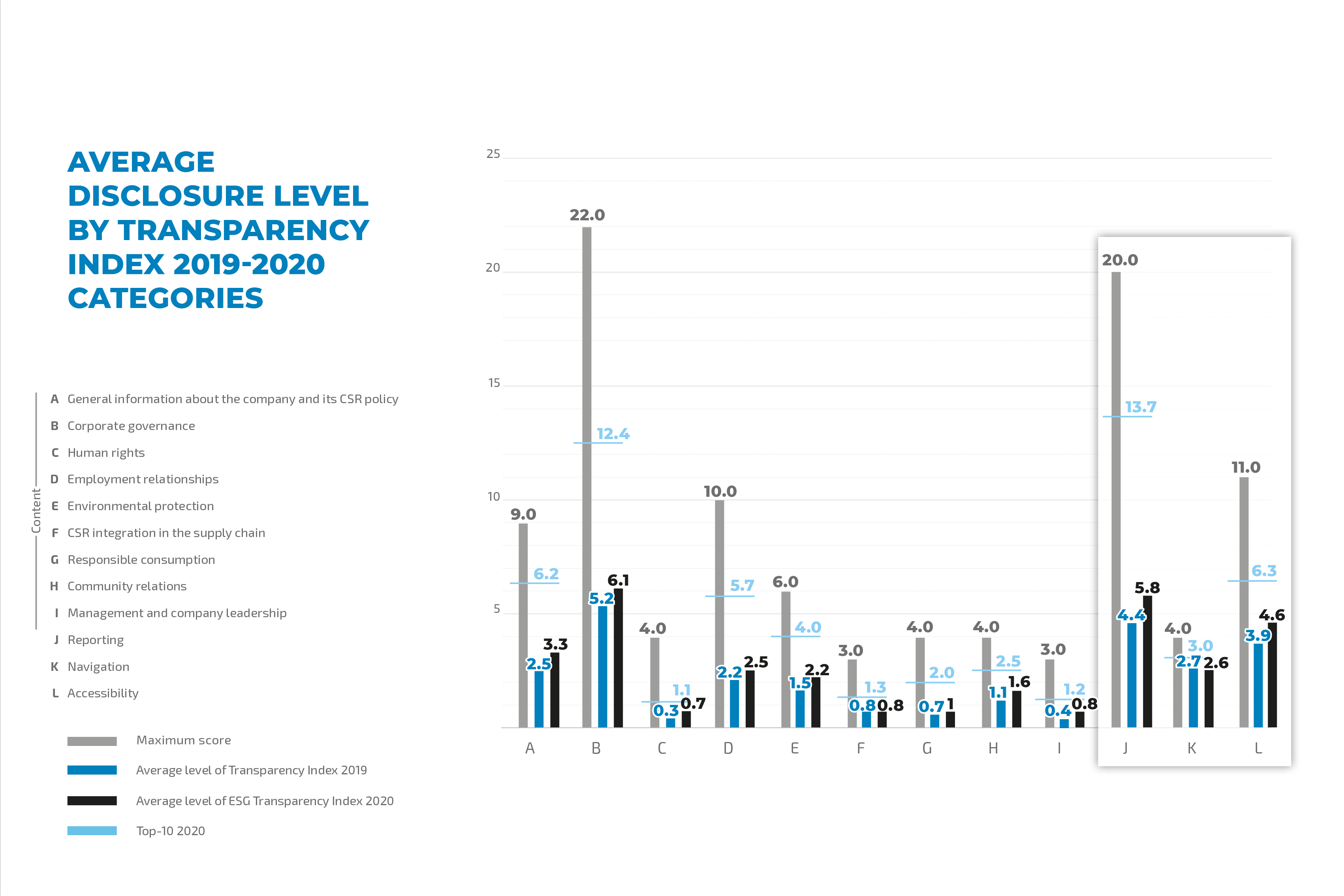
DISCLOSURE
LEVEL
BY CATEGORY
GENERAL INFORMATION
ABOUT THE COMPANY
AND ITS CSR POLICY
Out of the 56 companies featured in the assessment, 35 companies, 62.5 percent, publish information about their mission, vision, and values on their corporate websites or in non-financial reports. Out of this percentage, only 33 companies, 59 percent of the total companies assessed, have published Codes of Ethics, while 19 companies, 34 percent overall, have published information about their Development Strategies.
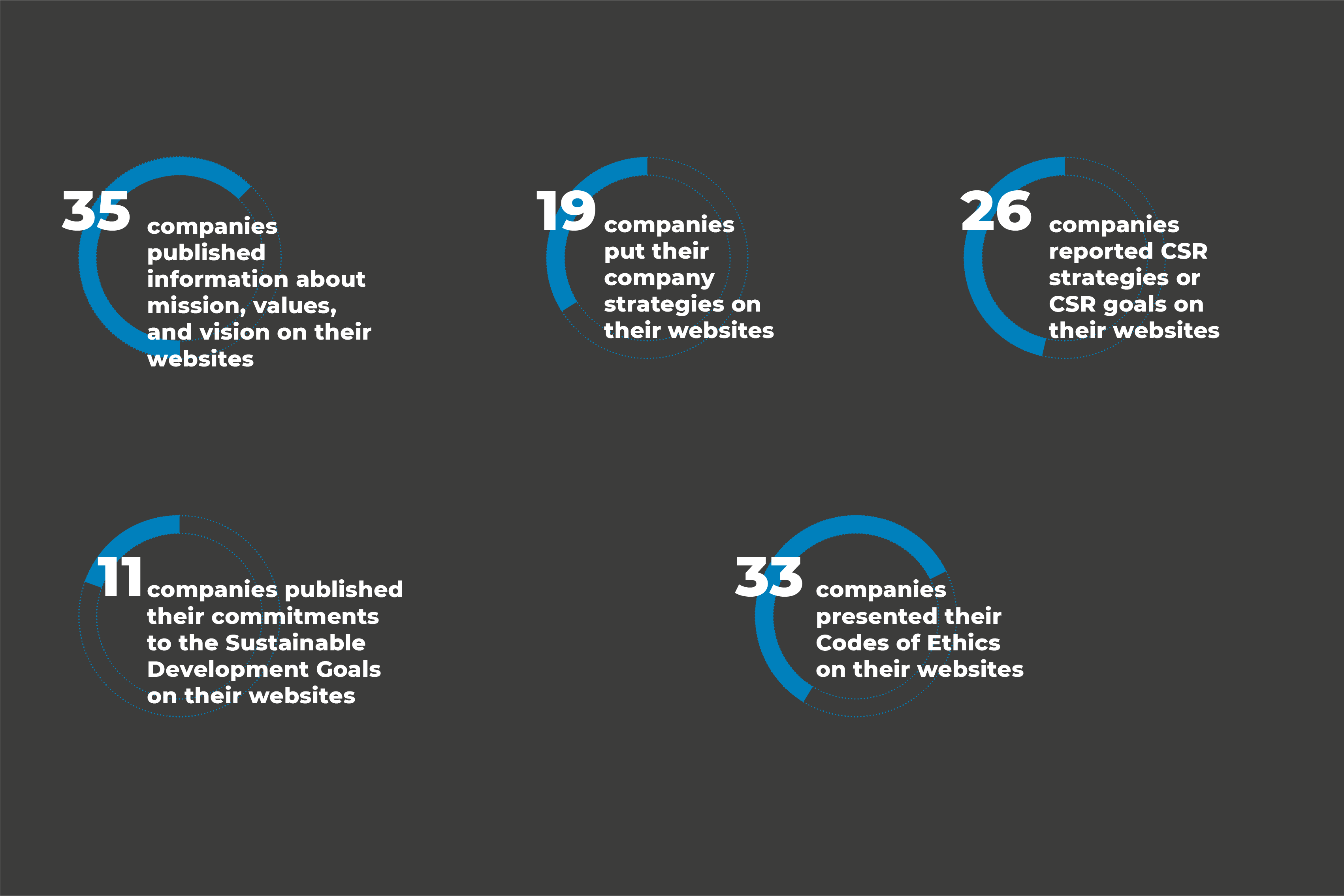
GENERAL INFORMATION
ABOUT THE COMPANY
AND ITS CSR POLICY
Less than half, 44.6 percent, of companies reported disclosing their CSR strategies or CSR goals on their websites or mentioning them in non-financial reports. The companies that have posted their policies or social responsibility strategies on their corporate websites include
- Coca-Cola Beverages Ukraine (Sustainable Development Commitments 2025)
- SE Administration of Sea Ports of Ukraine (Policy of Social Responsibility and Sustainable Development)
- JSC “Ukrgazvydobuvannya» (Standard of Corporate Social Responsibility in Cooperation with Communities, Charities, and NGOs)
- PJSC “Ukrhydroenergo” (Corporate Social Responsibility Strategy)
- NEC Ukrenergo (Corporate Social Responsibility Policy)
- SoftServe Inc. (Corporate Social Responsibility Policy)
- PJSC Arcelor Mittal Kryvyi Rih (Sustainable Development Policy)
- PJSC National Joint Stock Company Naftogaz (Social Responsibility Policy)
It is important to note that the level of information disclosure on the criterion “Integration of the UN’s Sustainable Development Goals in Ukrainian companies’ CSR policies» has doubled.
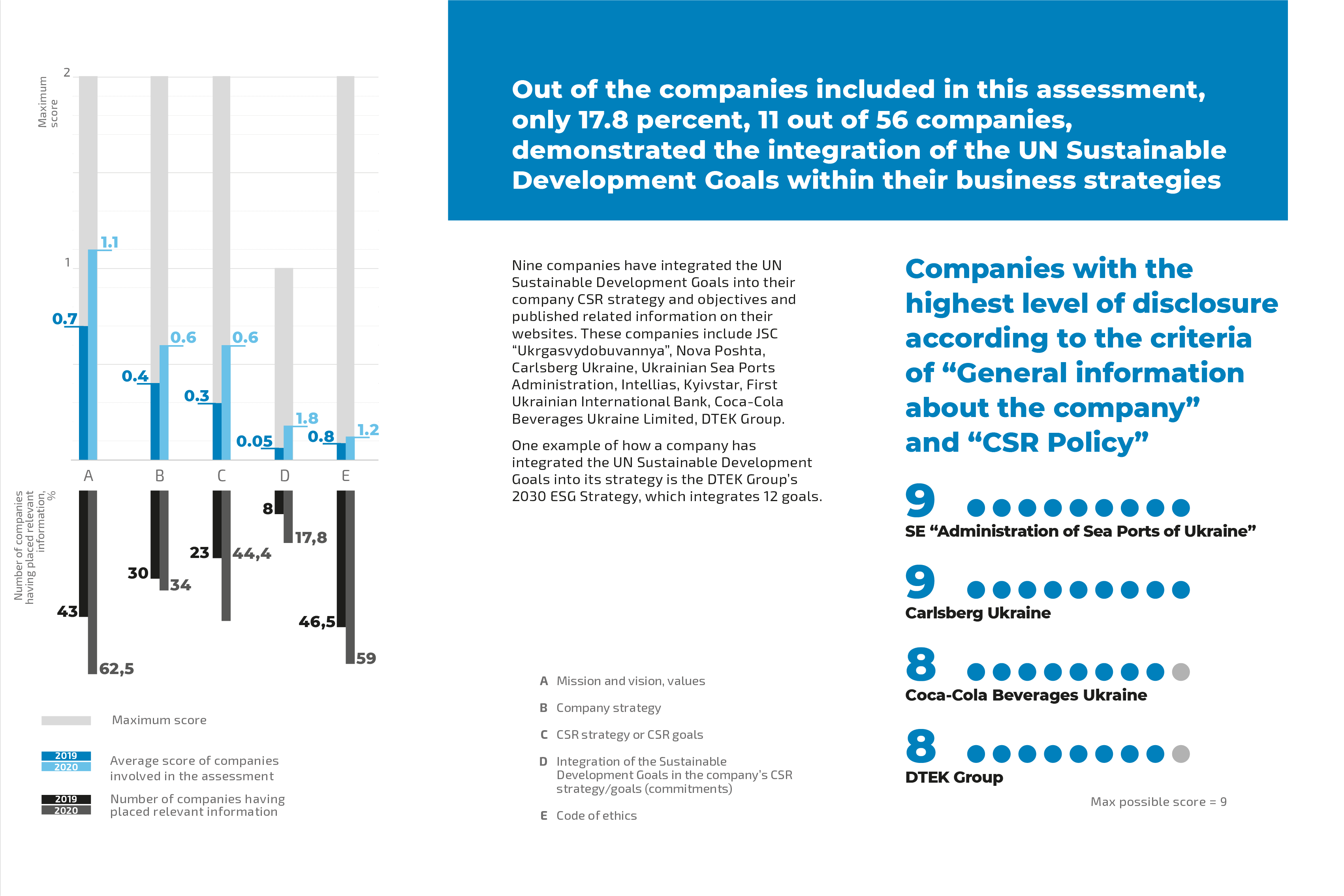
CORPORATE
GOVERNANCE
Compared to 2019, the average score of companies included in the assessment increased from 5.2 to 6.1 points in the “Corporate Governance” category in 2020.
When publishing information about their governing bodies on their websites, including Management Board, Board of Directors, and Corporate Secretaries, companies sometimes also included the functional responsibilities of members of these groups. The top-ranking companies in the “Corporate Governance” indicator for 2020 included JSB “First Ukrainian International Bank”, JSB “UKRGASBANK” (17 points out of 22 possible), PJSC “Ukrhydroenergo” (16.5 points), MHP (13.5 points), JSC Ukrainian Railway (13.5 points), NEC Ukrenergo (13 points).
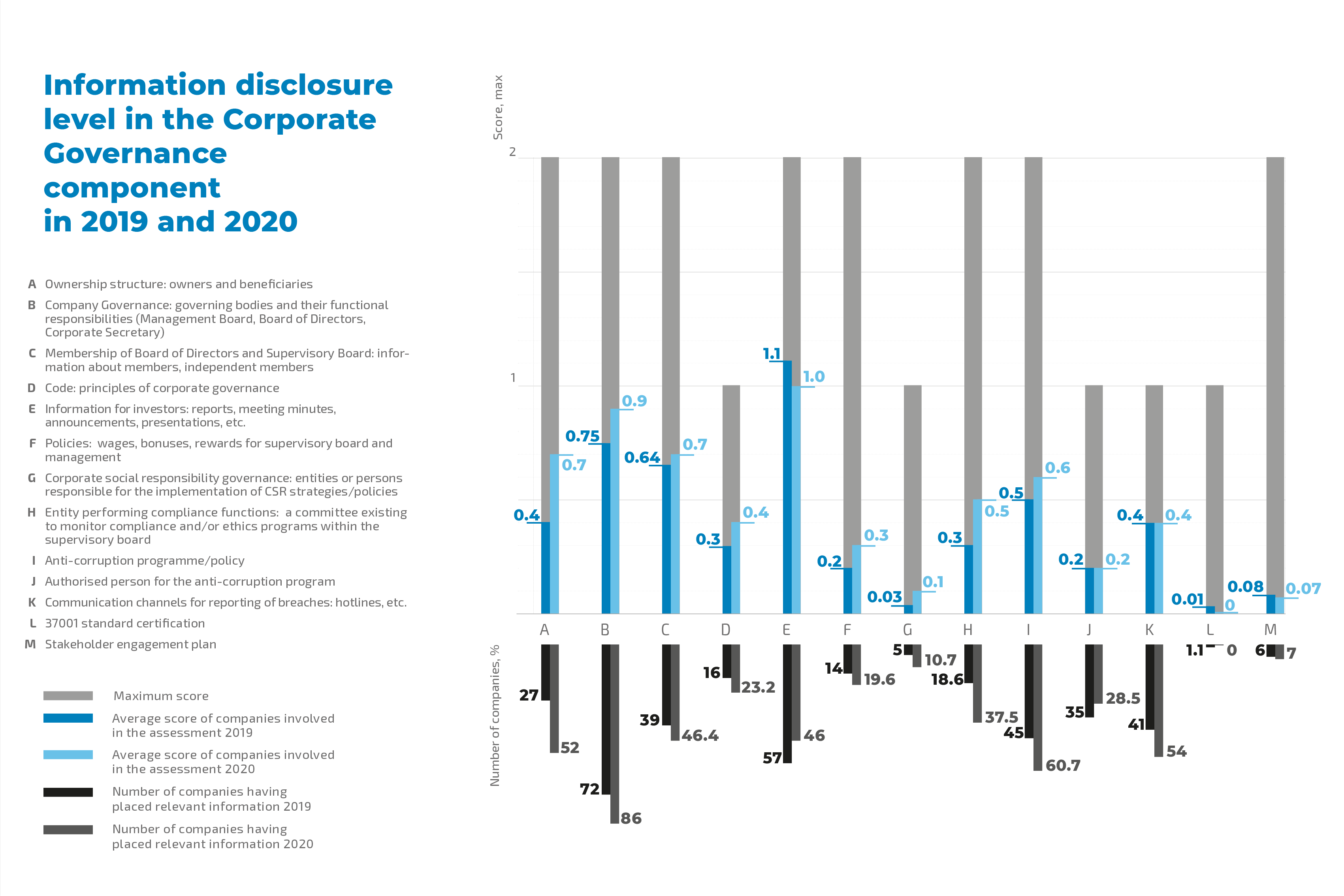
One of the prime components of corporate governance is anti-corruption policies and procedures. In 2020, twice as many companies disclosed information about their structure that performs compliance functions, 37.5 percent compared to 18.6 percent in 2019. While this ranking increased, a smaller proportion of companies disclosed information about their authorized anti-corruption program officer, 28.5 percent in 2020 compared to 35 percent in 2019. It should be noted that some companies are adopting innovative approaches in spreading ethics and compliance principles. For example, MHP developed and began piloting its Ethics and Compliance Ambassadors Program.
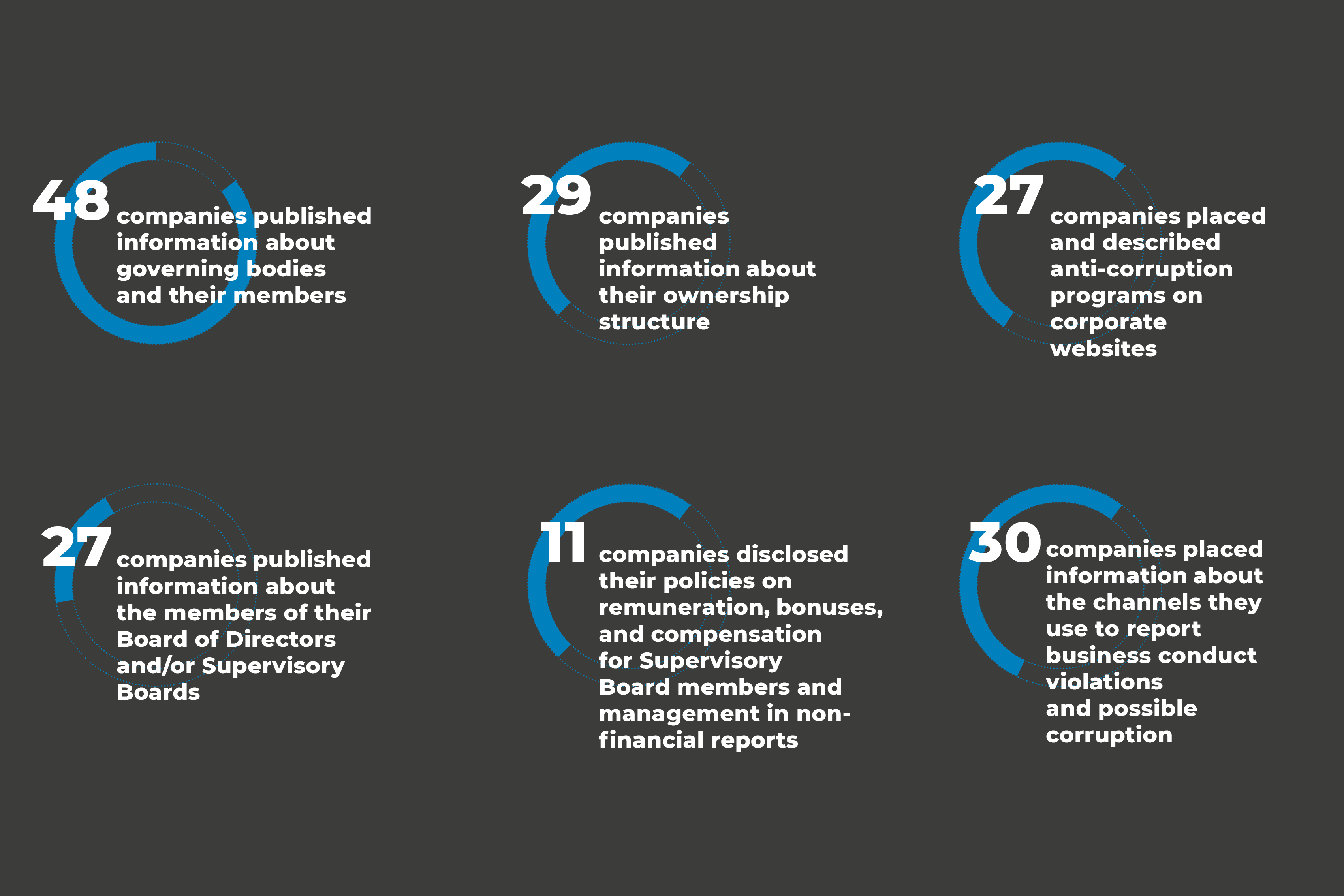
Stakeholder engagement plans were found to be published only on the following company websites: MHP, PJSC “ArcelorMittal Kryvyi Rih”, SE “NAEC “Energoatom” and JSC “Ukrainian Railway.” A small share of companies was found to provide information on corporate social responsibility management, six or eleven percent. However, it should be noted that there has only been a small increase in this regard compared to 2019.
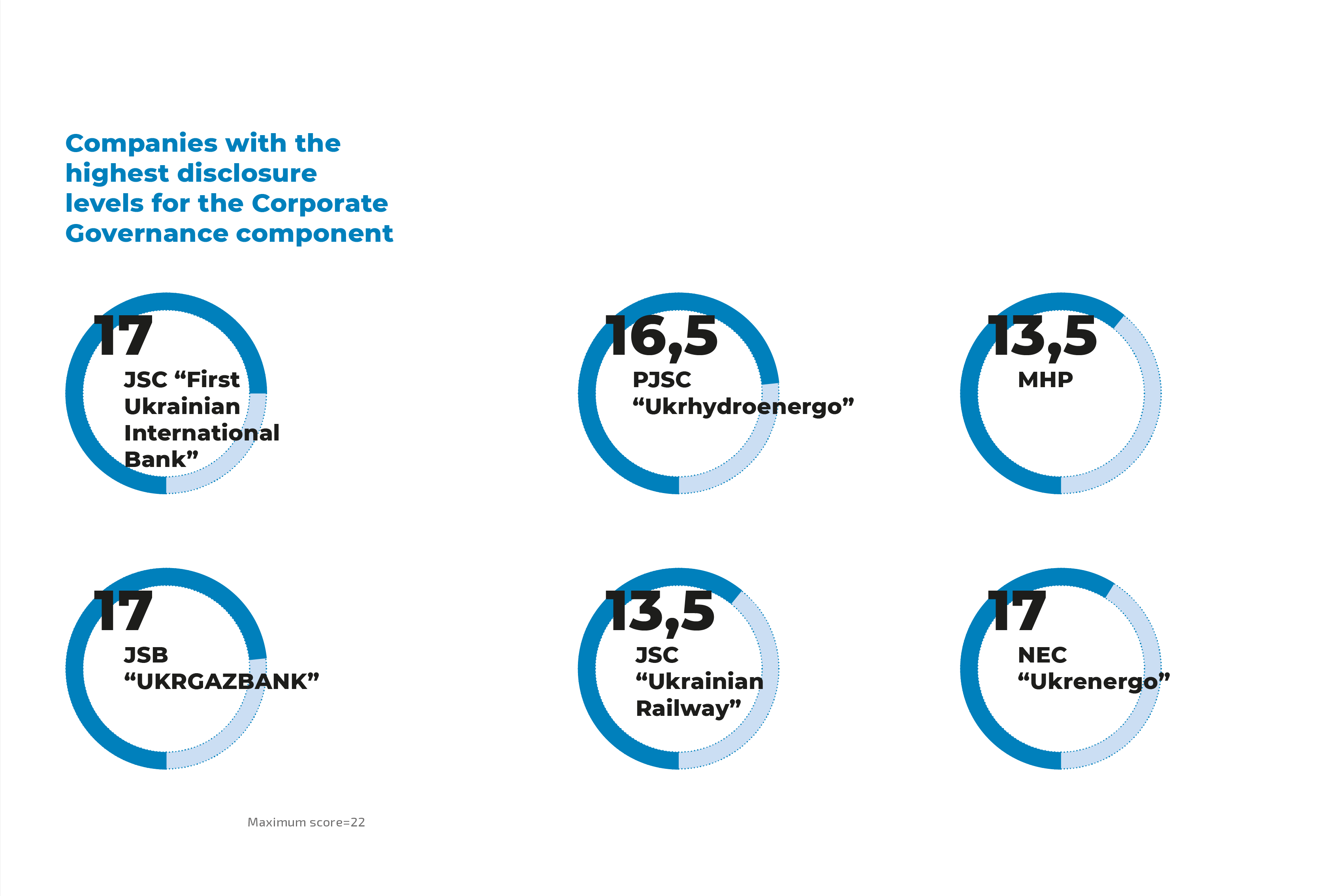
CONCLUSIONS
The level of transparency of Ukrainian companies is gradually increasing. ESG indicators disclosed by Ukrainian companies include:
- 26.4 percent SOCIAL ASPECTS, including human rights, labor relations, supply chain, responsible consumption, community development, management, and company leadership
- 36.6 percent ENVIRONMENTAL ASPECTS
- 27.7 percent CORPORATE GOVERNANCE ASPECTS
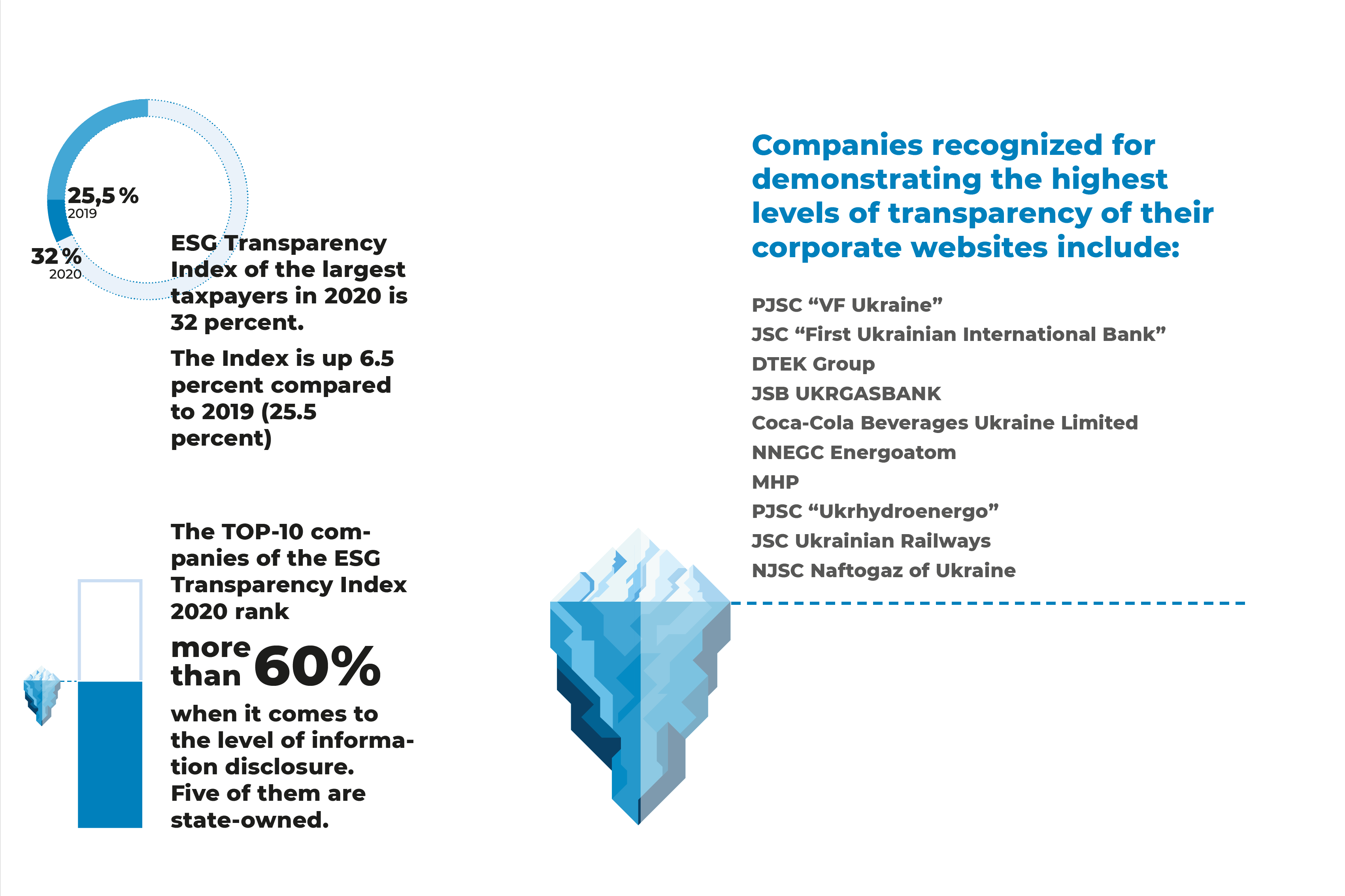
CGPA and CSR Ukraine’s assessment for 2020 concluded that the “Community Relations” and “Environmental Protection” categories marked the highest disclosure levels based on the analyzed companies. 2020 demonstrated an increase in the share of companies that publish information related to their CSR strategies and CSR goals and information on how they integrate the UN’s Sustainable Development Goals into their CSR strategies. As a result, the disclosure level for the “General Data About the Company” has also seen a high increase. Companies were found to publish general information and policies on ESG indicators, mainly on corporate websites. The results of CSR policies and practices are often published only in management or non-financial reports. Given the low level of preparation of non-financial reports, the level of information available regarding the results of CSR strategies and practices remains low.
The practice of non-financial reporting is not yet fully developed in Ukraine. The adoption of amendments to the Law “On Accounting and Financial Reporting in Ukraine,” which required large enterprises to prepare and publish Governance Reports since 2018, had a slight impact on improving the disclosure of information situation. Despite the amendments, only 58.5 percent of companies made their Governance Reports publicly available on corporate websites as of 2020. It is both CGPA and CSR Ukraine’s opinion that the main reason why the legislative norms of disclosing non-financial information in governance reports have not influenced an increase in the number of reports is that the issues of administration of collection and analysis of governance reports remain uncertain and the norms of administrative responsibility for violation of the procedure of submission and disclosure of governance reports are not applied.
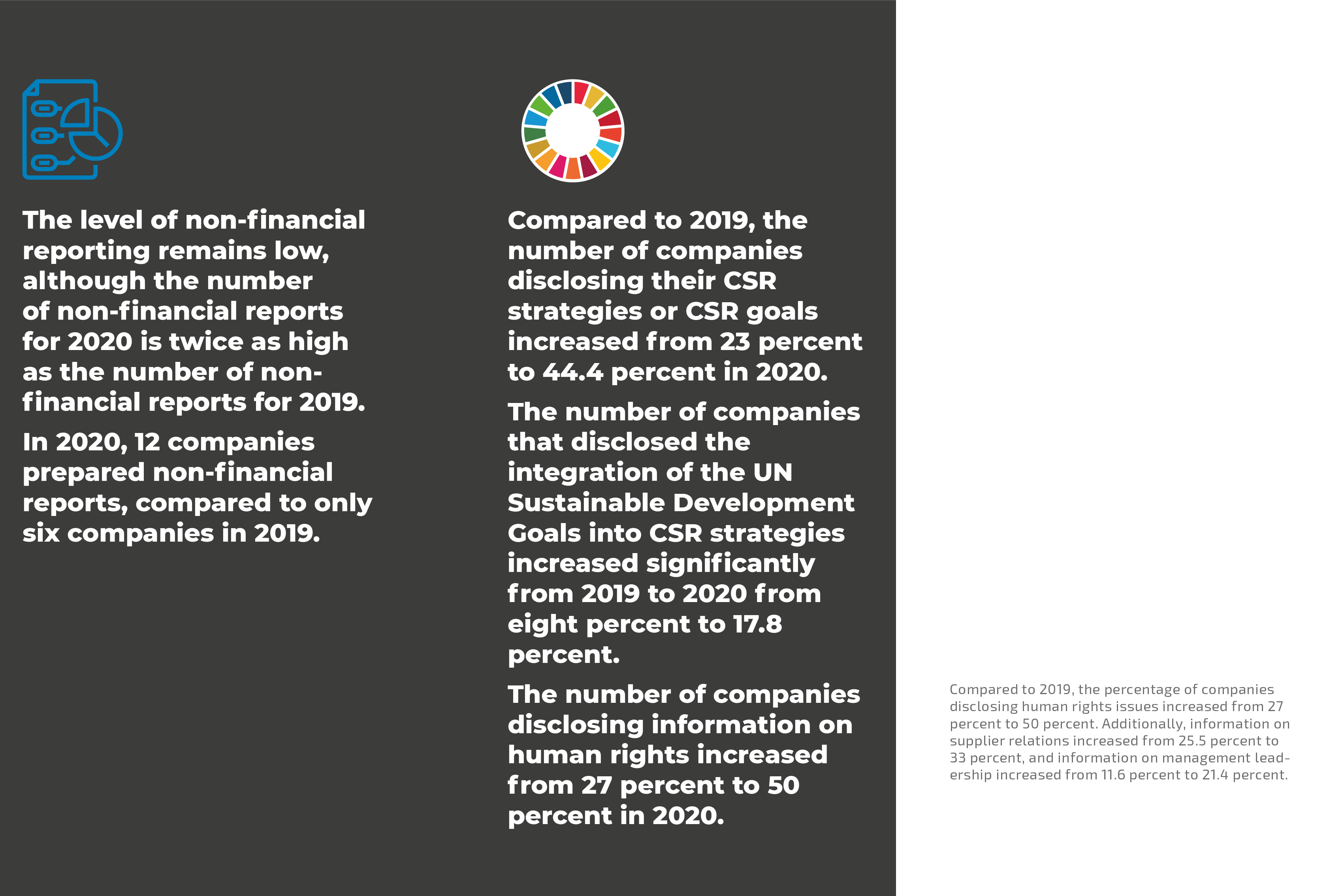
State-owned enterprises have higher scores on nearly all criteria and components included in the ESG Transparency Index compared to privately-owned companies
